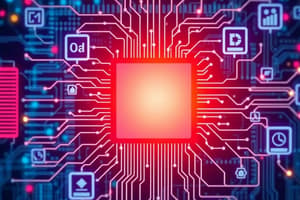Podcast
Questions and Answers
What does IT primarily refer to?
What does IT primarily refer to?
- The creation of software applications exclusively
- The use of computers and technology to manage information (correct)
- The study of computer science theories
- The development of hardware components only
Which of the following is considered a key component of IT?
Which of the following is considered a key component of IT?
- Marketing strategies
- Business ethics
- Consumer behavior
- Software (correct)
What is the main focus of cybersecurity within IT?
What is the main focus of cybersecurity within IT?
- Developing marketing analysis tools
- Enhancing web design
- Protecting systems from theft and damage (correct)
- Creating mobile applications
Which of the following describes cloud computing?
Which of the following describes cloud computing?
Which trend in IT involves the collection and analysis of large volumes of data?
Which trend in IT involves the collection and analysis of large volumes of data?
What is a significant role of system administration in IT?
What is a significant role of system administration in IT?
What does the Internet of Things (IoT) primarily enable?
What does the Internet of Things (IoT) primarily enable?
Which skill is commonly required across various IT careers?
Which skill is commonly required across various IT careers?
Flashcards are hidden until you start studying
Study Notes
Definition
- IT (Information Technology) refers to the use of computers, networks, and other technological tools to manage and process information.
Key Components
-
Hardware
- Physical devices like computers, servers, routers, and storage devices.
-
Software
- Applications and programs that run on hardware, including operating systems, databases, and productivity software.
-
Networking
- Systems that allow devices to connect and communicate, including the internet and local area networks (LAN).
-
Data Management
- Techniques to store, retrieve, and analyze data, including databases and data warehouses.
-
Security
- Measures to protect information technology resources from unauthorized access, attacks, and data breaches.
Key Areas in IT
-
System Administration
- Management of IT systems, including servers and networks.
-
Software Development
- Creation of software applications, often involving coding, testing, and deployment.
-
Cybersecurity
- Protection of computer systems and networks from theft or damage.
-
Cloud Computing
- Delivery of computing services over the internet, including storage, processing, and applications.
-
Data Science and Analytics
- Use of statistical methods and software tools to analyze data and generate insights.
Trends in IT
-
Artificial Intelligence and Machine Learning
- Automation and improvement of processes through intelligent systems.
-
Big Data
- Collection, processing, and analysis of large volumes of data to uncover patterns and trends.
-
Internet of Things (IoT)
- Interconnected devices that collect and share data via the internet.
-
Blockchain Technology
- A decentralized digital ledger used for secure transactions and record-keeping.
IT Careers
- Roles vary from technical (e.g., software developer, systems analyst) to management (e.g., IT manager, CTO).
- Skills often required include problem-solving, programming, and project management.
Importance of IT
- Drives innovation and efficiency in businesses.
- Facilitates communication and information sharing.
- Supports decision-making processes.
IT: Information Technology
- Focuses on using computers, networks, and other tech to manage and process information.
Key IT Components
- Hardware: Physical devices like computers, servers, routers, and storage devices.
- Software: Programs that run on hardware, including operating systems, databases, and productivity software.
- Networking: Systems that connect devices like the internet and local area networks (LAN).
- Data Management: Techniques to store, retrieve, and analyze data, including databases and data warehouses.
- Security: Measures to protect IT from unauthorized access, attacks, and data breaches.
Key Areas in IT
- System Administration: Manages IT systems, including servers and networks.
- Software Development: Creates software applications, often involving coding, testing, and deployment.
- Cybersecurity: Protects computer systems and networks from theft or damage.
- Cloud Computing: Delivers computing services over the internet, including storage, processing, and applications.
- Data Science and Analytics: Uses statistical methods and software tools to analyze data and generate insights.
Trends in IT
- Artificial Intelligence and Machine Learning: Automates and improves processes through intelligent systems.
- Big Data: Collects, processes, and analyzes large volumes of data to uncover patterns and trends.
- Internet of Things (IoT): Interconnected devices that collect and share data via the internet.
- Blockchain Technology: Decentralized digital ledger for secure transactions and record-keeping.
IT Careers
- Roles range from technical (like software developer, systems analyst) to management (like IT manager, CTO).
- Skills typically needed are problem-solving, programming, and project management.
Importance of IT
- Drives innovation and efficiency in businesses.
- Facilitates communication and information sharing.
- Supports decision-making processes.
Studying That Suits You
Use AI to generate personalized quizzes and flashcards to suit your learning preferences.




